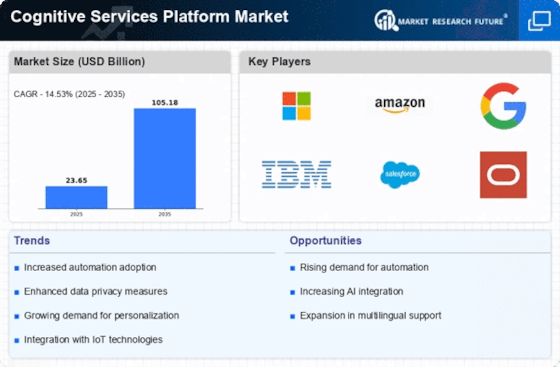Top Industry Leaders in the Cognitive Services Platform Market

Competitive Landscape of the Cognitive Services Platform Market:
The Cognitive Services Platform market, encompassing AI-powered tools for tasks like natural language processing, computer vision, and speech recognition, is exploding. Fueled by rising demand for data-driven insights and automation, this dynamic landscape boasts a diverse set of players vying for dominance. Let's delve into the market's competitive terrain, exploring key players, their strategies, and emerging trends.
Key Players:
- IBM Corporation (U.S.)
- Tata Consultancy Services Limited (India)
- Infosys Limited (India)
- Wipro Limited (India)
- Google, Inc. (U.S.)
- Microsoft Corporation (U.S.)
- General Electric (U.S.)
- Attivio (U.S.)
- Enterra Solutions LLC (U.S.)
- Numenta (U.S.)
Strategies Shaping the Market:
- Verticalization:Players increasingly tailor their offerings to specific industries like healthcare, finance, and retail. This caters to unique needs and fosters deeper customer relationships.
- Hybrid and Multi-Cloud Adoption:Enterprises are moving beyond single-vendor lock-in, opting for hybrid or multi-cloud deployments. This flexibility attracts players offering seamless integrations and open APIs.
- Evolving Pricing Models:Traditional pay-per-use models are giving way to subscription-based and outcome-based pricing. This aligns players' interests with customer success and fosters long-term engagement.
Factors for Market Share Analysis:
- Breadth and Depth of Offerings:The wider the range of cognitive services and the deeper their functionalities, the stronger the competitive edge.
- Scalability and Security:Enterprises prioritize platforms that handle massive data volumes securely and reliably.
- Ease of Use and Integration:Intuitive interfaces and seamless integration with existing workflows are crucial for user adoption.
- Industry Expertise and Partnerships:Domain-specific solutions and strong partnerships with technology and solution providers provide an advantage.
- Pricing and Commercial Flexibility:Competitive pricing models that cater to diverse needs attract a wider customer base.
New and Emerging Players:
- Startups: Companies like ScaleML, DataRobot, and Deepomatic are challenging established players with innovative AI algorithms and user-friendly interfaces.
- Open-Source Platforms:Apache Spark MLlib and TensorFlow are gaining traction with their flexibility and cost-effectiveness, attracting developers and smaller businesses.
- Edge Computing Players:Companies like Nvidia and Samsung are focusing on on-device AI solutions for real-time decision-making at the edge of the network.
Current Investment Trends:
- AI Infrastructure Expansion:Players are investing heavily in cloud infrastructure and AI hardware to handle the growing demand for data processing and model training.
- Talent Acquisition and Development:The race for skilled AI engineers and data scientists is fierce, with players implementing competitive talent acquisition strategies and investing in internal training programs.
- Partnerships and Acquisitions:Collaborations with technology providers, system integrators, and domain experts are accelerating, along with strategic acquisitions to broaden offerings and expertise.
- Focus on Ethical AI:Responsible AI development and deployment are becoming priorities, with players investing in tools and processes to ensure fairness, transparency, and accountability.
Latest Company Updates:
January 3, 2024, Microsoft Azure announces the general availability of its new Azure Cognitive Services offerings, including Text Analytics for Healthcare and Video Analyzer for Public Safety.
December 28, 2023, Amazon Web Services (AWS) launches Amazon SageMaker Groundbreaking, a new service for building and deploying large-scale AI models using cognitive services.
December 22, 2023, IBM Watson unveils a new suite of cognitive services for financial services, designed to help institutions prevent fraud, optimize risk management, and personalize customer experiences.










